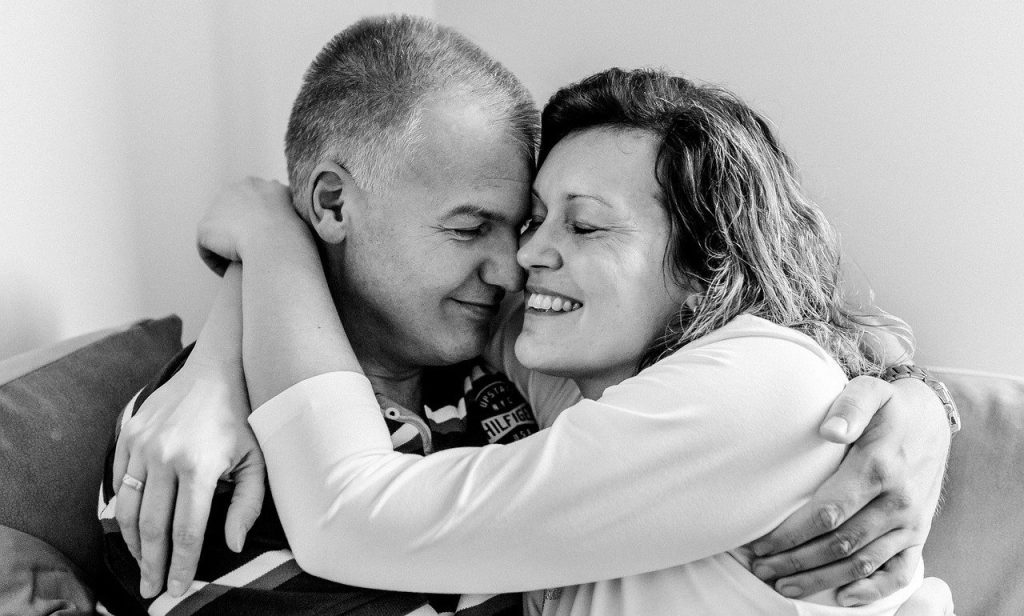Meaning Beyond the Message

A few nights ago, my husband and I were watching a movie in which a man and woman were lying in bed about to go to sleep. They snuggled in close and the woman whispered “I love you.” Her husband kissed her on the forehead but didn’t answer. The woman propped herself up on her elbow and said, “Aren’t you going to say it back?”
“Do I need to?” he asked.
“If you don’t say it, I can’t go to sleep,” she replied.
After this exchange in the movie, my husband looked at me and gave me a quirky smile. This same conversation has occurred between us in the past. Not so much anymore.
It got me to wondering whether saying “I love you” is really necessary, and if so, when, and why?
I do agree that is important to say the words. The people we love need to know that we love them. Children who are raised hearing this from their parents are more likely to develop a strong sense of worth, confidence, and the ability to accept and give affection. No, I didn’t do research so don’t go running to Google looking for the statistics. It simply makes sense.

Of course children who are loved know they are loved but they still need to hear it. The same goes for parents, grandparents, siblings, and anyone who is important to us. Adults need to hear it, too. We need to know that we are being thought of, that we are viewed in a positive way by our loved ones, that we are appreciated, and worthy.
However, not hearing the words, or even hearing them too often, can be warning indicators of a change in relationship status. When the spouse, significant other, or your moody teenager stops saying those words to you, or if they react adversely when you say the the words, we become aware of a change in our relationship.
Not hearing “I love you” can indicate that a married couple are drifting apart. It could mean that your current dating relationship has reached its limits and that it’s time to move on. Or it can mean that your teenager is pissed off at you because you wouldn’t let her go to that rock concert on a school night with her friends. Younger children may stop saying it because they are at an age where they testing their independence and mistakenly view it as a sign of weakness.
Not hearing “I love you” might be your first clue that all is not necessarily right with the world. However, hearing those same three words too often might be just as potent a sign that something needs to change.
Both men and women can be overly needy, constantly requiring reassurance that you do, in fact, love them. People who lack self-esteem seek validation that they are worthy of being loved and for some, those three words are the only ones that seem to give them that validation.
The phrase can also be a tool by which to gauge a relationship. In my much younger days, I dated a man to whom I said, “I love you.” His reaction? “I knew you were going to go all hitchy-heart on me.” Well, that was the end of that!
When I said it to my husband for the very first time, his reaction was quite different to say the least. He smiled and kissed me (he wasn’t quite ready to say it back at that point), but I knew my affections weren’t wasted on him. And I did, after all, marry him, so my instincts were right.
Neediness and relationship gauging aren’t the only reasons for saying “I love you.” Especially when it means something other than “I love you.” The words, spoken from the mouth of a significant other who hasn’t uttered them in a very long time, can be grounds for suspicion. A husband (or wife) who has been distant in the past, but now suddenly repeats it frequently with smarmy affection, has been known to suggest that (s)he is having an affair, or one of many other possibilities.
Of course, “I love you” has other meanings that don’t always have a negative connotation.
“I love you.” Translation: “Don’t be mad at me but …”
“I love you.” Translation: “There’s something I want to buy but it’s really expensive.”
“I love you.” Translation: “Now go away. I’m busy/annoyed/tired/etc.”
“I love you.” Translation: “I need a really, really big favor.”
I’m sure there are others. We’ve all used them. But let us not forget that “I love you” has one other very important meaning.
It really can mean nothing more than “I love you.”
“I appreciate you.” “You make me feel good about myself.” “I care about you.” “I know you care about me.” “I can’t imagine my life without you in it.”
But with all those sentiments packed into three simple little words, is it necessary to always say them? If we don’t say them, does it mean we don’t love you?
Not at all. There are so many other ways to say “I love you.”
In the early stages of our relationship, my husband once told me, “Words are just words without the actions to back them up.” Actions mean more than words, with that, I wholly agree.
If I forget to say “I love you” or if my husband doesn’t return the sentiment when I say it to him, I know that he still loves me. It’s in the details of our daily lives together. We show each other our love through our actions – the way we speak to each other, the way we treat each other, the small, simple, selfless acts that are done for no other reason than to make the other happy.

I know he loves me when he adds a side of fruit to my breakfast because he’s concerned about my health and eating habits. He knows I love him when I remind him the hockey game starts in five minutes, relinquish possession of the remote control, and make him a snack. Prying me away from the computer and suggesting I take a break and go to the bookstore (it is impossible for me to emerge without purchasing an armload of books), is his one of his many ways of saying “I love you.” Suggesting he treat himself to a new power tool he really doesn’t need, is my way of saying it to him. It’s in the “thank-yous,” the warm smiles, the small affections we offer each other throughout our daily lives.
We still say those words to each other, often right before we fall asleep at night. Or in the middle of the day for no reason at all. If we don’t say it, we still know it.
For us, “I love you” is more than just a few words. It is an action reaffirmed by words. Words that, even when they are not spoken, are still heard.
